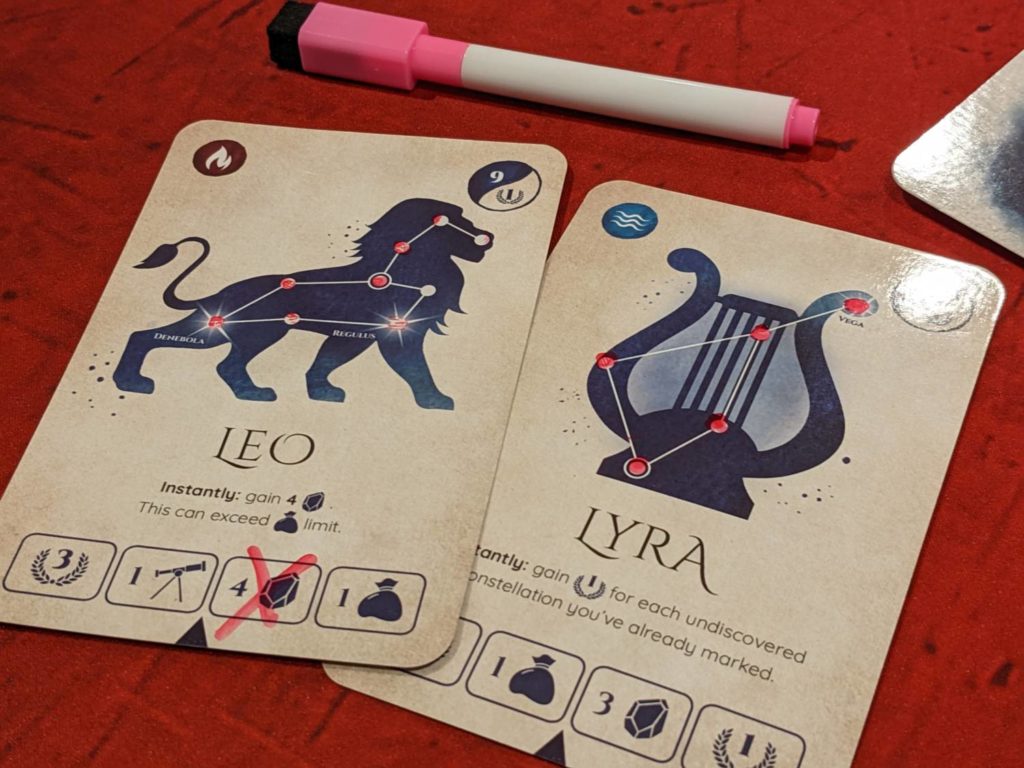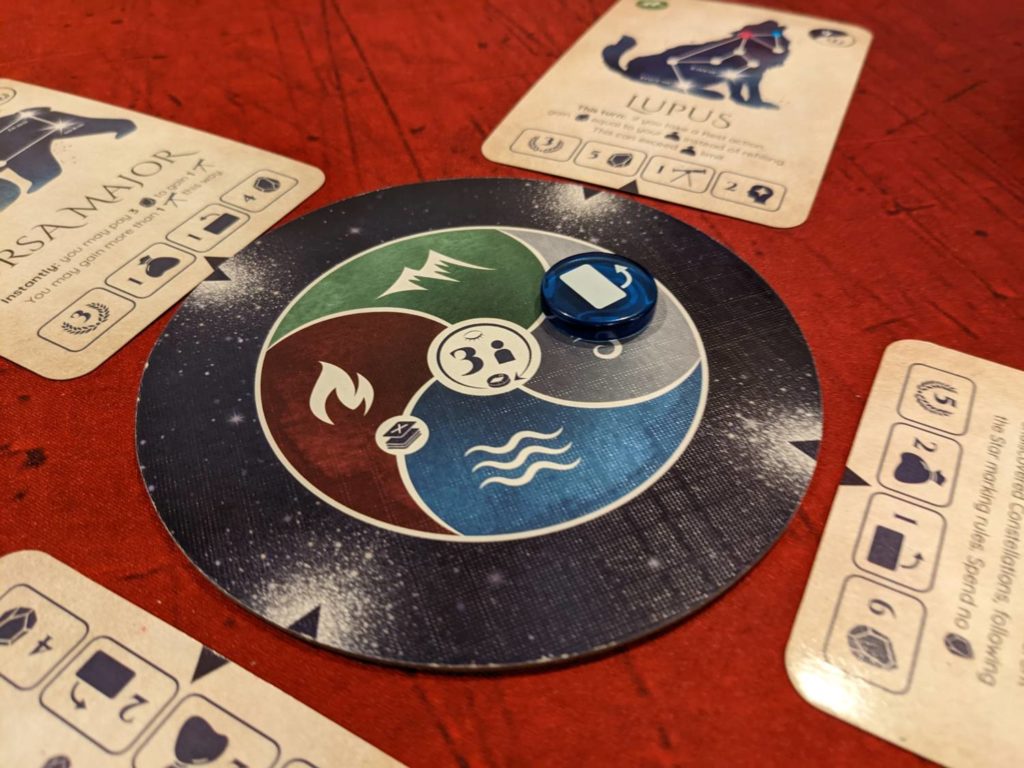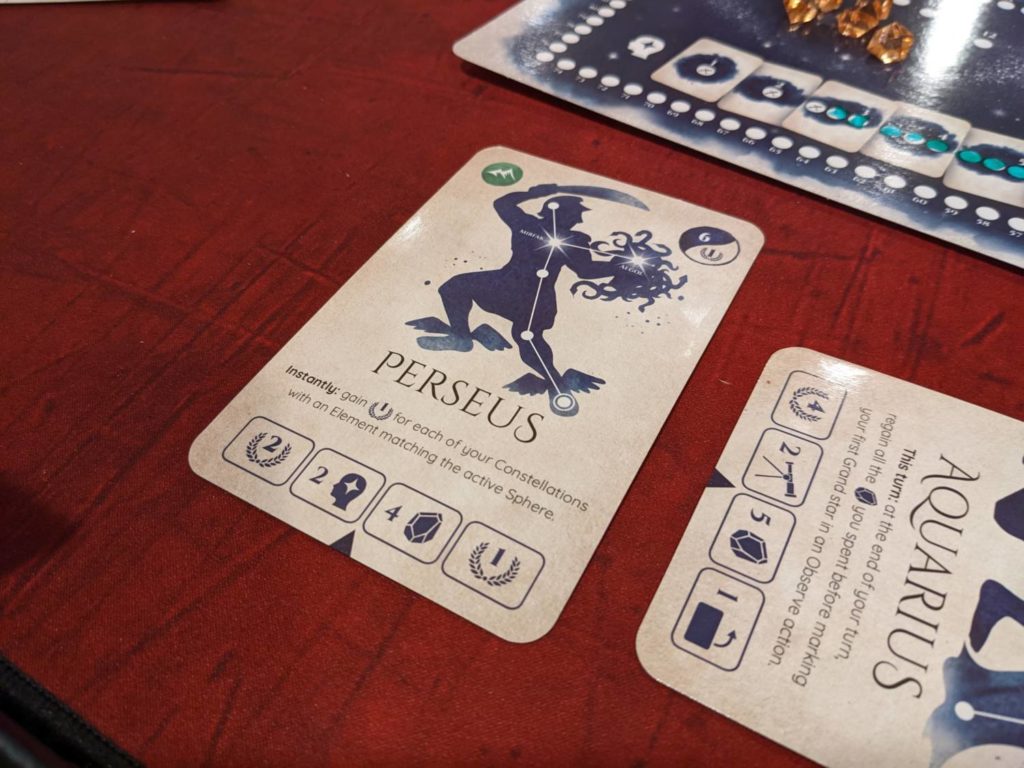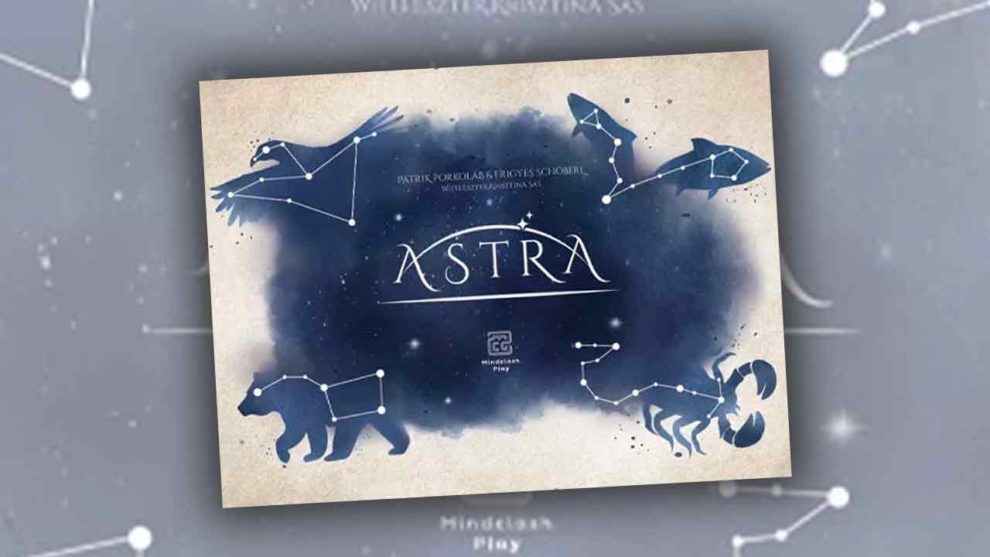Disclosure: Meeple Mountain received a free copy of this product in exchange for an honest, unbiased review. This review is not intended to be an endorsement.
Mindclash Games, as a brand, means one word to me more than any other: heavy.
Heavy everything. 30-page rulebooks, heavy on theme, heavy in terms of box weight, heavy strategic elements. For the fancier deluxe versions of Mindclash products, heavy on the prices, too.
But Mindclash is changing. In speaking with multiple Mindclash team members at my last two conventions, it’s clear that the publisher of recent stars like Anachrony and Trickerion would like to diversify. Mindclash is always going to make great games, but why do all of those games need to take so long to teach and play, particularly for newer gamers?
Enter Astra, the first game in the Mindclash Play line, a line that aims to produce one lighter game each year which will ship direct to retail. A flip-and-write without any writing, Astra is much lighter than any other Mindclash game to date. It’s easy to teach, features cool artwork, and has a price that makes the game accessible to anyone.

The Stars Align
Astra is an area control, set collection game for 2-5 players, built around the theme of astronomers competing to discover constellations in the night sky. Armed with a dry-erase pen, a small player board and a market of constellation cards scaled to the player count, you’ll spend “stardust” each turn to mark stars on one of the cards in the market a number of times equal to the stardust that you spend.
Each of the game’s 48 cards is a constellation. Players will spend each turn marking up the cards in the market (“undiscovered constellations”) by coloring in stars, and the person who colors in the final star will get to keep the card in their tableau. All other players who colored at least one dot on a card will get a reward, based on who had the most colored stars. That reward, a “boon”, might be points, more stardust, the ability to take additional turns, or an increase in the size of stardust gems that can be held in a pouch when that player takes the rest action.
But those cards do more than show off pretty pictures. Each has a power that can be exhausted to start a turn, including some powers that are pretty sweet. They also build towards a set collection goal that could score massive points for a player who invests in a lot of a single suit of cards (each tied to one of the four elements in the game). Those can usually only be refreshed by taking a rest action, which allows players to refill their pouch as well as refresh any cards matching the element showing on the central track on the market board.
So, your actions are straightforward: color in stars on constellation cards or rest. The juice comes from the element all good area control games use to reward players: spreading out and making sure you can get paid on as many cards as possible. In addition, you’ll need to win a few cards, ideally the ones which will score you more points because you’ve got a head start on a couple of elemental tracks.

You Need Wisdom
Astra has a few other things going on, but it’s definitely lighter fare. As such, plays will land best with those who prefer casual games that don’t overstay their welcome.
Here’s what works well. The downtime in Astra is quite low; when you rest, your turn takes maybe five seconds. When you take a normal turn, you’ll spend a few stardust gems, color in a few stars, and move to the next player. Great. Card powers are sometimes incredible, and it’s fun to figure out ways to spread out on each card then close out on the cards that will give you better end-game scoring bonuses because of the head start each player is given on their unique, secret final scoring conditions.
Cloudy skies begin to form when one considers the game’s rules, though. You are legally able to spend one stardust, mark one star, then finish your turn.
But what if lots of players do that?
Each of my plays of Astra have featured an interesting problem: there’s the game of Astra, and buried just beneath that, there’s a friendly game of chicken.
Sometimes, turns go like this: Alec marks the start space of the 14-star Draco card, spending one stardust. Johnny goes next, and marks one star of the same card. I take a turn, spending two stardust to mark two stars on a separate card.
A few minutes later, most of the cards have not really changed; it’s clear that no one really wants to win these cards because they don’t match the suit needed to align with their other cards. Or maybe it is because the powers on those cards don’t get anyone excited.
And if no one rests, cards do not cycle into the discard pile from the draw deck—the game only moves forward if people start winning completed cards. I am critical of flip-and-write and/or roll-and-write games like Twilight Inscription because holding a dry-erase marker doesn’t really have appeal with a longer game, but at least in Astra I’m directly interacting with all of the players at the table.
A couple of my Astra plays went long because no one wanted to take any cards. And, it’s fair to see some of that strategy: you can only increase your pouch size, reset cards outside of the rest action, or score in-game points if you LOSE cards and take boons instead.

The House Rule
And that’s where I end up on Astra: you will need to add a house rule to really make it shine.
My vote: change the starting pouch size to seven stardust (instead of the five stardust marked on the player mats), then require all players to mark at least three stars on a single card on each turn when they take the observe action, less if their observe action closes out a card.
Not only will this greatly increase the speed of play, it will still provide interesting decisions to each turn, particularly in a round where someone has to choose between a card that they have to take. Astra will still be easy to teach, and the game will take less than an hour even at the full player count of five players.
Astra needs these changes to really work. As it is, players have sometimes finished games with me and stood up with the shoulder shrug that accompanies an average experience. The initial promise is there, the cards look amazing, and I love the decision space when it comes to taking boons to increase my ability to take future cards.
A shorter running time tightens up the experience. Make these changes to the standard rules and I think you will enjoy yourself with Astra!












Add Comment